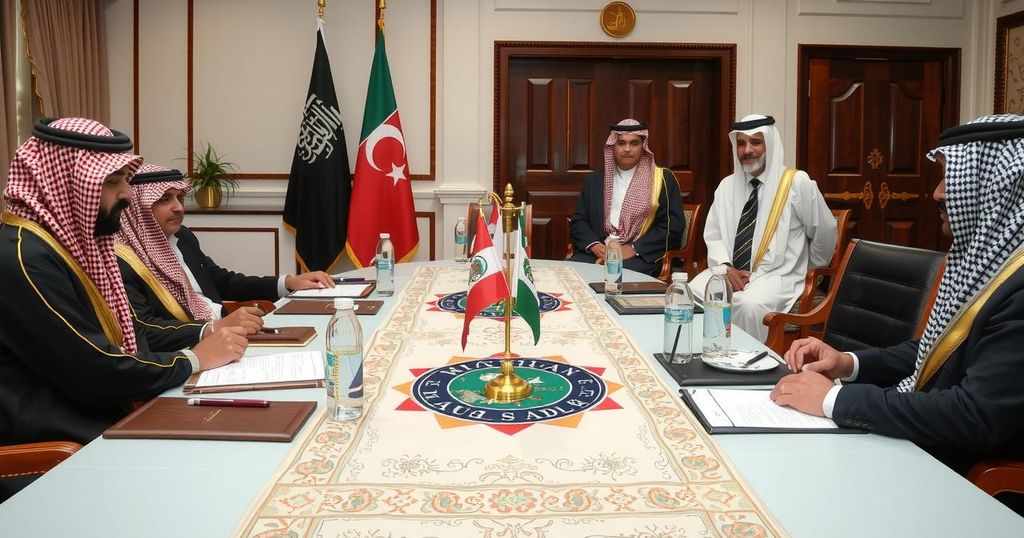Secretary of State Antony Blinken met with Arab foreign ministers in Jordan to discuss Syria’s political transition post-Assad. The discussions centered on implementing a Syrian-led process, as regional players adjust to the changing landscape following the regime’s upheaval. Turkey’s increasing influence and concerns about rising instability further complicate matters in the region.
Secretary of State Antony J. Blinken convened with Arab foreign ministers in Jordan to discuss the ongoing political transition in Syria, following the recent removal of the Assad government. The discussions focused on supporting a comprehensive, Syrian-led political process tailored to achieve lasting stability amidst the shifting political landscape.
The abrupt fall of Bashar al-Assad’s regime has sparked jubilation within Syria while simultaneously raising concerns regarding the leadership of the new caretaker premier, Mohammed al-Bashir, as he attempts to steer the war-torn nation through its reconstruction. This transformation poses a significant challenge amid a broader regional upheaval, impacting relations with key players like Israel, Iran, and Russia, all of whom have vested interests in the outcome of Syria’s political landscape.
Mr. Blinken was anticipated to hold talks in Aqaba with representatives from Jordan, Saudi Arabia, Iraq, Lebanon, Egypt, the Arab League, Turkey, the United Nations, and the European Union. There was no indication that a representative from Syria would participate in the meeting. Meanwhile, Turkey has increased its influence by reopening its embassy in Damascus after nearly 13 years and conducting military operations against Kurdish forces in northern Syria.
Turkish Foreign Minister Hakan Fidan articulated a firm stance towards the Kurdish People’s Protection Units (YPG), declaring, “It is our strategic target to eliminate the YPG”. This is particularly poignant given the historical collaboration between Kurdish forces and the U.S. against Islamic State insurgents, ending a complex dynamic as Turkey pushes its own agenda in the region.
The destabilization of Syria since the onset of civil war in 2011 has significant implications for the United States and its allies, as they monitor the landscape fraught with competing factions and armed groups. Israel has also taken this opportunity to target Syrian military assets, prompting responses from the Assad regime, which has called for international intervention against these actions.
During Mr. Blinken’s tour in the Middle East, including visits to Ankara and Baghdad, American officials stressed concerns regarding the potential repercussions of ongoing instability in Syria on neighboring countries. As the situation evolves, the balance of power in the region remains precarious, with all parties awaiting the outcome of the transitional process and its broader geopolitical consequences.
The current situation in Syria is the result of years of international diplomatic complexity and internal conflict. Following the civil war that began in 2011, a multitude of factions vied for power, and the recent ousting of Bashar al-Assad marks a significant turning point in the region’s dynamics. Arab nations and international stakeholders are assessing how to best engage with a new Syrian administration facing immense challenges, including rebuilding from decades of repression and conflict. The geopolitical implications of Syria’s transition affect various regional actors, notably Turkey, Israel, Iran, and Russia, all with diverse interests at stake as they navigate the aftermath of the regime change.
In summary, Secretary Blinken’s meeting with Arab foreign ministers in Jordan underscores the complexity of Syria’s political transition following the fall of Bashar al-Assad. With various regional stakeholders eager to influence the outcome, the focus remains on creating a sustainable and inclusive political process in Syria. The implications of this transition extend far beyond Syria’s borders, affecting relationships and security throughout the Middle East.
Original Source: www.nytimes.com






